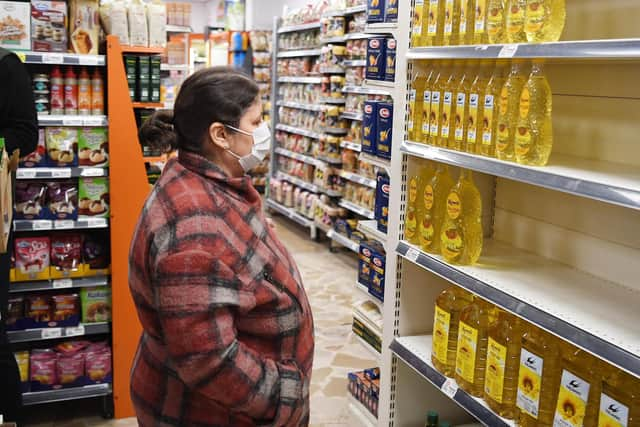Shoppers warned crisps, chips and biscuits ingredients may not be what it says on the tin as Ukraine war sparks sunflower oil shortage
The warning comes as manufacturers of foods such as crisps, oven chips and cereal bars are being forced to alter their recipes due to a shortage of sunflower oil caused by the war in Ukraine.
As much as 80 per cent of the world’s sunflower oil comes out of Russia and Ukraine.
Advertisement
Hide AdAdvertisement
Hide AdThe UK's leading bottler says it only has a few weeks of supply left because the conflict has sparked major disruption to imports.
Edible Oils, which packages oil for three quarters of the UK retail market, is ramping up stocks of other oils to use in its place.
Supplies could be impacted for at least a year.
Speaking to the BBC, Kim Matthews, commercial director for the firm, said: “From a UK consumer perspective, sunflower oil is the biggest oil.
“It’s used more than anything else.


“It’s a fast-moving situation.
“We’re still trying to see if we can get some more but it’s looking very tight.
“At the moment, Ukrainian farmers should be sowing the seeds now for the harvest in October and November.


“Clearly that’s not going to happen.”
Many producers are switching to refined rapeseed oil as a replacement, but because the move is having to happen so quickly some are unable to change their product labelling in time.
Other products which usually contain sunflower oil include biscuits and mayonnaise.
As a result, Food Standards Scotland (FSS) and the Food Standards Agency (FSA) are warning shoppers to be aware of the potential changes to ingredients.
Advertisement
Hide AdAdvertisement
Hide AdIn a statement, the FSA said: "The majority of the UK’s sunflower oil comes from Ukraine and food businesses here are reporting that supplies of sunflower oil are likely to run out in a few weeks with some businesses already experiencing severe difficulties.
"This has led to some food manufacturers urgently replacing sunflower oil with refined rapeseed oil before being able to make the change on the label.
"We are therefore advising that food products labelled as containing sunflower oil may instead have been produced using refined rapeseed oil and consumers should look out for additional information being provided by retailers and manufacturers to stay informed."
It said the safety risk from the substitution is “very low”.
FSA chief executive Emily Miles said: “FSA and FSS have been working hard to understand the recent pressures on our food supply chain and the interim measures needed to make sure certain foods – like crisps, breaded fish, frozen vegetables and chips – remain on sale here.
“We have looked at the immediate food safety risk of substituting sunflower oil with refined rapeseed oil – particularly to people with a food allergy – and it is very low.
“We know allergic reactions to rapeseed oil are very rare and – if they do occur – are mild.
“Retaining consumer trust remains an absolute priority for both organisations and we are urgently working with the food industry and other partners to ensure labels on food where sunflower oil has been replaced by refined rapeseed oil are made accurate as soon as possible."
A message from the Editor:
Thank you for reading this article. We’re more reliant on your support than ever as the shift in consumer habits brought about by coronavirus impacts our advertisers.
If you haven’t already, please consider supporting our trusted, fact-checked journalism by taking out a digital subscription.
Comments
Want to join the conversation? Please or to comment on this article.
